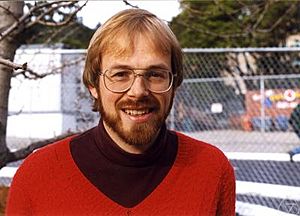Richard Taylor (mathematician) facts for kids
Quick facts for kids
Richard Taylor
|
|
|---|---|

Taylor in 1999
|
|
| Born |
Richard Lawrence Taylor
19 May 1962 Cambridge, England
|
| Nationality | British, American |
| Alma mater | Clare College, Cambridge (BA) Princeton University (PhD) |
| Awards | Whitehead Prize (1990) Fermat Prize (2001) Ostrowski Prize (2001) Cole Prize (2002) Shaw Prize (2007) Clay Research Award (2007) Breakthrough Prize in Mathematics (2015) |
| Scientific career | |
| Fields | Mathematics |
| Institutions | University of Oxford Harvard University Institute for Advanced Study Stanford University |
| Thesis | On congruences between modular forms (1988) |
| Doctoral advisor | Andrew Wiles |
| Doctoral students |
|
Richard Lawrence Taylor, born on May 19, 1962, is a brilliant British mathematician. He studies number theory, which is a branch of mathematics focused on numbers and their properties. Today, he is a special professor at Stanford University in California.
He has won many important awards, including the Cole Prize in 2002, the Shaw Prize in 2007 (which he shared with Robert Langlands), and the Breakthrough Prize in Mathematics in 2015.
Contents
Richard Taylor's Journey in Mathematics
Richard Taylor started his university studies at Clare College, Cambridge in England. He earned his first degree there. While at Cambridge, he was the president of a student math club called The Archimedeans in 1981 and 1982.
Becoming a Doctor of Mathematics
He then went to Princeton University in the United States. In 1988, he earned his highest degree, a Ph.D. in mathematics. His special research project was about "congruences between modular forms." His teacher and guide for this project was the famous mathematician Andrew Wiles.
Teaching and Research Positions
After finishing his studies, Richard Taylor worked at several top universities around the world.
- From 1988 to 1995, he taught at the University of Cambridge.
- From 1995 to 1996, he was a special professor at the University of Oxford.
- He then moved to the United States, teaching at Harvard University from 1996 to 2012.
- From 2012 to 2019, he was a professor at the Institute for Advanced Study, a famous research center.
- Since 2018, he has been a professor at Stanford University in California.
Richard Taylor's Important Discoveries
Richard Taylor is known for his work in number theory, especially for helping to solve some very difficult math problems.
Helping to Prove Fermat's Last Theorem
One of his most famous contributions was helping Andrew Wiles with the proof of the Taniyama–Shimura conjecture. This conjecture was a key step in finally proving Fermat's Last Theorem, a math problem that had puzzled mathematicians for hundreds of years!
When a small problem was found in Wiles's first attempt to prove the conjecture in 1993, Wiles asked Taylor for help. Together, they worked to fix the gap. Their method for solving this part of the problem is now known as "Taylor-Wiles patching."
Other Key Research Areas
Richard Taylor has also made other important discoveries:
- With another mathematician named Michael Harris, Taylor helped prove parts of the local Langlands conjectures. These are complex ideas about how different areas of mathematics connect.
- He also worked with Christophe Breuil, Brian Conrad, and Fred Diamond to fully complete the proof of the Taniyama–Shimura conjecture. This involved a lot of very detailed calculations.
- In 2008, Taylor announced a proof for part of the Sato–Tate conjecture. This conjecture is about how certain mathematical patterns are distributed.
Awards and Special Recognition
Richard Taylor has received many honors for his amazing work in mathematics.
- He won the Whitehead Prize in 1990.
- He received the Fermat Prize and the Ostrowski Prize in 2001.
- The Cole Prize from the American Mathematical Society was awarded to him in 2002.
- He received the Shaw Prize for Mathematics in 2007.
- In 2015, he won the Breakthrough Prize in Mathematics. This award recognized his many important results in the theory of automorphic forms, including his work on the Taniyama–Weil conjecture, the local Langlands conjecture, and the Sato–Tate conjecture.
He has also been recognized by important scientific groups:
- He was elected a Fellow of the Royal Society in 1995.
- In 2012, he became a fellow of the American Mathematical Society.
- In 2015, he joined the National Academy of Sciences.
- He was elected to the American Philosophical Society in 2018.
About Richard Taylor's Family
Richard Taylor is the son of another well-known British scientist, physicist John C. Taylor. Richard Taylor is married and has two children.
See also
 In Spanish: Richard Lawrence Taylor para niños
In Spanish: Richard Lawrence Taylor para niños
 | Aaron Henry |
 | T. R. M. Howard |
 | Jesse Jackson |

